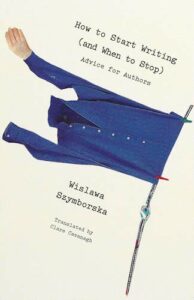
Wisława Szymborska on Learning to Write from Life
“Seek out friends who read widely.”
The following is excerpted from Wisława Szymborska’s How to Start Writing (and When to Stop) and first appeared in Lit Hub’s Craft of Writing newsletter—sign up here.
The texts that make up Polish poet Wislawa Szymborska’s typically idiosyncratic “How to (and How Not to)” guide are culled from the advice she gave—anonymously—for many years in “Literary Mailbox,” a regular column in the Polish journal Literary Life. (Szymborska used the first-person plural to maintain her anonymity, since Polish grammar relentlessly reveals its user’s gender, and she was the only woman on Literary Life’s editorial staff who answered letters.)
–Clare Cavanagh, translator
*
To Waldemar, from Kraków
Of course you can suddenly start writing after forty. That’s not even particularly late, given that other laws govern such mature beginnings. A youthful debut succeeds by way of imaginative freshness and a still unfettered worldview. Impressions, not reflections, dominate; spontaneous observations take the place of insights drawn from a hard-won understanding of the world. From a late debut, on the other hand, we expect additional virtues: a fair share of human experience and—in cases not involving fact-based memoirs—a consciously shaped literary taste. In a word, a forty-year-old shouldn’t write as if he or she were seventeen, since then neither time nor mental gifts will take up the slack.
To U. T., from Kraków
A young musician attends the conservatory, a young artist studies at the academy, but the young writer has nowhere to go. You view this as an injustice. Not so. Schools for musicians and painters provide first and foremost technical knowledge you’d be hard pressed to acquire on your own in relatively short order. What is the writer to learn at his institute? Any ordinary school is all it takes to push a pen across the page. Literature holds no technical secrets, or at least secrets that can’t be plumbed by a gifted amateur (since no diploma will help the talentless). It’s the least professional of all artistic callings. You may take up writing at twenty or seventy. You may be a professor or an autodidact. You may skip your high school diploma (like Thomas Mann) or receive honorary doctorates at multiple universities (again like Mann). The road to Parnassus is open to all. In principle at least, since genes have the final say.
To Eug. Ł., from Inowrocław
The same old complaint about “youth.” This time we’re supposed to forgive the author since he still hasn’t been anywhere, experienced anything worth mentioning, or read everything that he should. Such confessions betray the belief (adolescent, hence a bit simplistic) that external circumstances alone make the writer. That his creative quality derives from the quantity of his life adventures. In fact, the writer develops internally, within his own heart and mind: through an innate (we repeat, innate) propensity for thought, acute sensitivity to minor matters, astonishment at what others see as ordinary. Trips abroad? We sincerely hope you’ll take them, they sometimes come in handy. But before you head off to Capri, we suggest a trip to Lesser Wółka. If you come back with nothing to write about, then no azure grottoes will save you.
To Tede., from Chełm Lub
Of course, real talent requires tips and pointers, especially to start. But these lessons should come easily, almost incidentally. A genuine sense for what’s better or worse aesthetically, what’s more or less important, what works, or doesn’t and why: it is not simply a matter of wide reading and familiarity with various -isms. It is above all instinct. We take the liberty of saying this after long years of observation. A few comments on a flawed metaphor may keep one novice poet from making the same mistake twice. A whole day’s conversation won’t help another. That same instinct will draw the beginner to those who know more than he does, who surpass him in experience, sensitivity and culture. Such people may be found wherever you look for them. We are not asking you to drop your current friends, we simply doubt that they suffice. From your letter we gather that your heart may be taken, but that your head is still up for grabs.
To Elżbieta G., from Warsaw
“How can I teach myself Polish literature, especially poetry?” If you don’t have a high school diploma, then you should at least tackle the required curricula for literature and history. Pick up literary journals. Attend readings. Follow discussions. Seek out friends who read widely. A rather pleasant course of study, though it can’t promise immediate results. Such is life. Brief, but each detail takes time.
__________________________________

From How to Start Writing (and When to Stop) by Wisława Szymborska, published by New Directions. All works by Wisława Szymborska copyright © 2000, 2021 by the Wisława Szymborska Foundation. Translation copyright © 2021 by Clare Cavanagh.
Wisława Szymborska
Winner of the Nobel Prize for Literature, Wisława Szymborska, who was born in Poland and worked as an editor, columnist, and translator, was “accessible and deeply human and a joy —though it is a dark kind of joy — to read. She is a poet to live with.” —Robert Hass, The Washington Post Book World



















